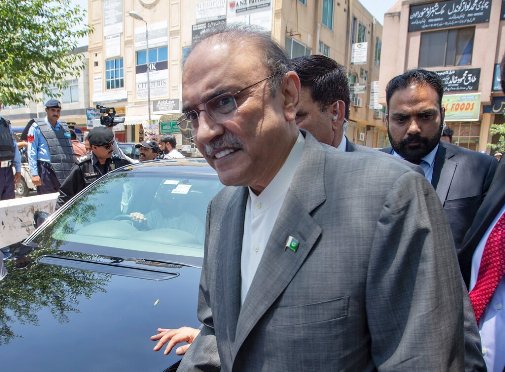Ex-president of Pakistan indicted on money laundering charges
By Salman Masood
ISLAMABAD — A former president of Pakistan, Asif Ali Zardari, was indicted Monday (28) in a money laundering case, the latest legal action against him and one that his supporters say is part of a wider trend against politicians opposed to Prime Minister Imran Khan.
Zardari is the widower of former Prime Minister Benazir Bhutto, who was assassinated in 2007. He served as president from 2008-13, and is currently a member of Parliament. He is also facing a raft of court cases.
He was arrested in June 2019 by anti-corruption officials in a separate money laundering case and released on bail on medical grounds in December.
During the court hearing Monday, a sister of Zardari, Faryal Talpur, and 13 other people were also indicted. Zardari and his sister denied the charges.
The charges against Zardari are related to money laundering through suspicious bank accounts and companies.
He and other opposition politicians have accused the Khan government of political victimization. Khan, who won the 2018 election on a strong anti-corruption platform, denies the accusation. But critics say that Khan’s government, in collusion with Pakistan’s powerful military, is targeting the opposition in the guise of accountability.
When asked by court reporters for his comments on Monday’s indictment, Zardari replied with a verse in Urdu: “We have passed through such junctures earlier also.”
Before becoming president in 2008, Zardari spent 11 years in jail on corruption and murder charges. He was never convicted and has maintained his innocence, but allegations of corruption have followed him in his political career. The former president has remained active in politics, and his son, Bilawal Bhutto Zardari, is chairman of the opposition Pakistan People’s Party.
Chaudhry Manzoor Ahmed, another senior Pakistan Peoples Party figure, said the indictment was a routine process in court proceedings and that the real issue was a lack of evidence.
“Where is the evidence?” he said. “There is no evidence against Mr. Zardari.”
“He has spent several years in jail on trumped-up charges,” Ahmed added. “So, it’s nothing for him. But for us the biggest concern is his ailing health.”
Ahmed said the government had been increasing the pressure on opposition parties since Sept. 20, after a meeting of opposition groups that have called for, among other things, an end to military interference in Pakistan’s politics. Opposition parties have also warned of countrywide protests against the Khan government and the military next month.
“These court cases are the usual tactics to intimidate and threaten the political leadership,” Ahmed said. “But we are not bothered by such tactics.”
Also Monday, anti-corruption officials arrested the leader of the opposition in Parliament, Shehbaz Sharif, president of the Pakistan Muslim League-Nawaz, after a high court rejected his bail plea in a money laundering case in the eastern city of Lahore.
Sharif is the younger brother of the ousted prime minister, Nawaz Sharif, who is in London for medical treatment.
The arrest was widely expected. Sharif, who has served as chief minister of Punjab province, said last week that Khan, the prime minister, personally wanted to see him behind bars.
Marriyum Aurangzeb, spokeswoman of the Pakistan Muslim League-Nawaz, said Monday that, “Shehbaz Sharif was arrested on the orders of Prime Minister Imran Khan.”
She said the arrest was politically motivated.
-New York Times


